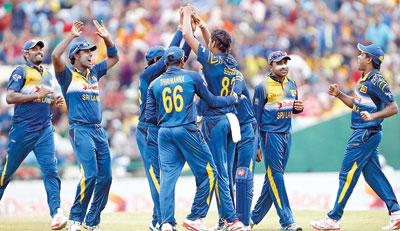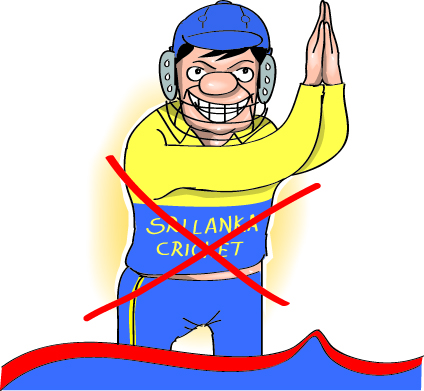Some cricketing concerns and good governance
View(s):While the euphoria of the anticipated change is now underway, for those of us a change meant a bit more than the grazing pastures. It is time to put the thinking cap on and shout out loud about our pound of flesh.

Cricket is an aspect that has managed to bring all Sri Lankans together - File pic
The Sunday Musings is not worried about the political arena per say. It is up to those who want a new way of life or a new economic pathway. Yet, in these sports columns our desire is to see the advent of a new sports culture which is void of any political influence and interference.
We all know that Arjuna Ranatunga – the World Cup winning captain who played a leading role in bringing this new era to a reality and who is a vocal critic of the prevailing sports culture — in all probabilities will play a leading role in the sporting marathon at hand. Yet, he must remember that he was also grazing in this same meadow – where cricket is concerned. On January 1, 2008, Arjuna Ranatunga took over the reins of Sri Lanka Cricket as its Interim Committee chairman, but, was shown the door after eight months , which he blamed on Indian pressure. This was the result of his anti-Indian stance over the IPL cavalcade — which he opted to take like the David of the Indian Ocean.
It was a brave act, but too stubborn a stance not in tune with the realities of the region and cricketing economics in general.
Besides, we at this end feel that he did not make it an issue enough of the negatives of the building of the Hambantota Cricket Stadium in a wilderness where it will not be beneficial to the uplift of the game at regional or national level. Now it has become a burden on the State as it is maintained by the army. But, now it is too late in the day to criticise, but to swallow the bitter pill and continue looking after this cricketing white elephant.
However, if you could think of a manner that this colossal expenditure could have been put into good use so that even the cricket in the neighbourhood would benefit, we could discover more budding Suranga Lakmals from the vicinity. If a plan like that is put into action and the Hambantota area finds five more national cricketers within the next five years, maybe one can partially justify building an international Cricket Stadium in the middle of nowhere.
There are more cricketing cultures that need to be changed. Some could be achieved and the others are so deep rooted it maybe well-nigh difficult. The first is the culture of the government in power placing its own puppets in pivotal positions. Though the rest of the positions in the cricket  executive committee are up for grabs, the reality is that the decision making still remains with the ruling party or the sports minister and his acolytes.
executive committee are up for grabs, the reality is that the decision making still remains with the ruling party or the sports minister and his acolytes.
Likewise, it is the politically appointed puppets, who are most powerful and it is they who even begin the fights within, looking to secure their positions with the club system by means which sometimes are not ethical. Yet, in the back of their minds they know that they have the political backing and they can fall back on those laurels any time they need.
Another startling factor is the declining standards of the game and the feeding factors to it. In the era that Arjuna Ranatunga played the game at school level, it was confined to a few schools and the standard of school cricket was of a high standard.
But, since winning the World Cup in 1996, the game has taken root to all corners of the island. At first glance it looks great; cricket has spread its way into the interior. But, in reality the authorities have lost control of the spread and as a result the basic standards have suffered. Now there is quantity. But, thirty years ago every year the system used to put out an Arjuna Ranatunga, an Aravinda de Silva, a Ranjan Madugalle, a Sidath Wettimuny and the list can go on. But, in recent times does the schools arena come up with quality products who can walk into the national team at the age of 17-19?
Then if the systems do not work in that fashion, the authorities must look for other ways of discovering excellence and nurturing them from a younger age. The Indian system is not based on school cricket, but, it still produces Virat Kohlis. In recent times, the best that we have produced is Lahiru Thirimanne.The most volatile situation prevails in the upper echelons of the game. It is not a secret that there is a growing gap between international cricket and the first class game in Sri Lanka. Not that this has gone unnoticed; people like Sidath Wettimuny, Aravinda de Silva and some others saw the lurking dangers and used their inner skills in developing the Provincial Cricket tournament. However, it had its teething problems and the structure could not be properly laid out. Why? Because the club system which has taken deep roots over the past one hundred years stood in its way. The fear in the clubs is that if the Provincial system is given preferential status, the clubs would lose their stranglehold of the game. But, what is happening now is that even the club system is not producing quality cricket and the national grid is gradually going dry.
If the club system is to grow, it should be in good shape. With the air drop of political people into the key positions of the cricket administration the club system does not have a way of mooting their agendas. At the same time even the club system is controlled by certain factions and they keep manipulating the moment the authority gives a little leeway. Arjuna Ranatunga is a person who is well aware of this status.
Then there were politicians who are trying to promote their kith and kin in the arena. We saw even recently to pacify a certain powerful minister, the national selectors named a prodigal son of 35,000ft latitude into the World Cup squad. But, was that move any benefit to Lankan cricket in general?
However the most despicable situation arose when the national selectors and national cricketers were lured onto the Political platform. Yes, each adult citizen is entitled to have his own political convictions, but, we believe cricket is the only redeeming factor that the sports loving public have in this country, and everyone agrees that national cricketers should be kept out of the political platform. Moreover, besides T.M. Dilshan, the others who took stage were periphery characters and then when they are selected to the national team it tends to leave question marks by the way.Even history making Lankan off spinner Muttiah Muralitharan had questioned one such selection. This is an important issue that we must take as a sporting nation. Cricketers in the calibre of Kumar Sangakkara, Mahela Jayawardena, Ranjan Madugalle and Roshan Mahanama have become known through the cricketing world more than any of the local politicians. We are of the view that while any cricketer is in contention for national honours, they should be banned from taking part in active politics or endorsing candidates.


